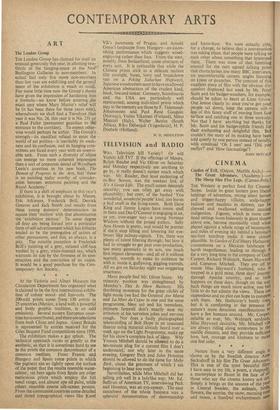TELEVISION and RADIO
WILL Television kill Variety? Or will Variety kill TV? If the offerings of Messrs. Ralph Reader and Vic Oliver. on Saturday and Monday respectively are anything to go by, it really doesn't matter much which way. Mr. Reader, that least endearing of ex-Boy Scouts, was the weakest link of h's A Great Life. The small screen demands sincerity; you can often get away with plausibility; but corn, of the hushed 'You wonderful, wonderful people' kind, just leaves a bad smell in the living-room. Both Dave King and Jimmy Logan have comic stuff in than and Des O'Connor is engaging in an, as yet, over-eager way—a young Norman Wisdom without the poised pathos. Sally Ann Howes is pretty, and would be prettier if she'd stop lifting and lowering her eye- brows like railway-signals. Yes, there was plenty of talent filtering through; but how it had to struggle to get past over-production, too many gimmicks in its acts, too much first impact cleverness—and all of it without warmth, warmth to make its audience be with it, inside it, guffawing, giggling warmth. All we got on Saturday night was sniggering smartness.
Many people find Mr. Oliver funny. My minority position was strengthened by Monday's This Is- Show Business. His throbbing reverence for the great cliches of light music (we had the Gounod Ave Maria and La Mort du Cygne in one and the same programme, bless us) and his tremulous, intimate farewell don't exactly ease my irritation at his nerveless jokes and nervous cough. Nor does a badly photographed telerecording of Bob Hope in an unnamed theatre using material already heard over a week ago on the Light Programme, make up for his show's complete lack of ideas. Why Yvonne Mitchell should be allowed to do a tenminute plug for a current film I don't understand; nor why later in the same evening, Gregory Peck and John Houston should be allowed to do the same for Moby Dick, about the greatness of which I am beginning to hear too much.
Nevertheless, while Miss Mitchell did her selling job well in a ladylike way, Mr. Ed. Sullivan of American TV, interviewing-Peck and Houston, was an eye-opener. The easy casualness of the whole business was a splendid demonstration of showmanship and know-how. We were actually able, for a change, to believe that a conversation was taking place, that people were talking to . each other about something that interested them. There was none of that fumbling around for the next agreed talking point that characterises too many BBC interviews, no uncomfortable camera angles focusing on knees or paunches. The contrast of this excellent piece of film with the obvious dis- comfort displayed last week by Mr. Peter Scott and his badger-watchers, for example, should be taken to heart at Lime Grove. One lesson clearly is: once you've got )(it- people sat down, keep the camera still less of this fancy stuff of moving from face to-face and catching one in three unready. Not that 1 have anything but thanks for Mr. Scott and his badgerophile friends for their enchanting and delightful film. But couldn't the story of its making have been told quietly by one person instead of noisily, with continual 'Oh I sees' and 'Did you reallys?' and 'How fascinatings'?
JOHN METCALP










































 Previous page
Previous page